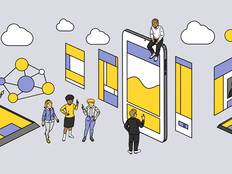Hands-On Tech Experiences Prepare Students for the Workforce
Artificial intelligence is no longer an emerging technology at many colleges and universities. AI powers up chatbots that assist students with classes and helps IT staff automate tedious work.
But, as AI evolves and is empowered to do more across all industries, how will universities step up to prepare future employees for a changing workplace? A survey from Northeastern University and Gallup found that just 22 percent of people with a bachelor’s degree or higher believe that their education prepared them “well” or “very well” to work with AI.
Also, nearly half of the people surveyed would rather get AI-related training from an employer.
“Taken together, these results are a wake-up call for higher education,” Joseph E. Aoun, the president of Northeastern University, writes in the report. “The need for colleges and universities to adapt is clear. We must design and implement a curriculum that empowers humans to be ‘robot-proof’ — to do the jobs only humans can do.”
Relying on the data from the Northeastern and Gallup survey, we’ve examined how they might help higher ed institutions prepare students for the workplace of the future.
SIGN UP: Get more news from the EdTech newsletter in your inbox every two weeks!
A Blend of Soft and Tech Skills Prepare Students for the World
While 76 percent of Americans surveyed by Northeastern and Gallup say AI will fundamentally change the way people work and live, only 23 percent say they are worried they could lose a job to the new technology. To decrease the likelihood of that happening, respondents identified the key skills that workers need to cultivate to work with AI technology.
Of those surveyed, 49 percent say softer skills such as teamwork, communication, creativity and critical thinking are critical for workers of the future. However, 51 percent say that developing harder skills in math, science, coding and data analytics will be highly important for employees to work alongside new technologies.
Though the survey respondents don’t have faith that higher education as a whole can instill workers with the skills needed for the future, some universities are already offering innovative programs that foster these skills.
For example, at the Georgia Institute of Technology, leaders at the Advanced Manufacturing Pilot Facility have embraced the role of technology in manufacturing — the Northeastern and Gallup survey finds that 62 percent believe AI will impact this industry with job losses. Students who are trained the in the facility work with the latest technologies and local business partners, so when they are done with college, they are prepared for the reality of the workforce.
Students at Southern Connecticut State University are getting hands-on experience with components of AI and data analytics through their work with IBM Watson. Business and computer science students in an internship program at SCSU collaborate with local businesses to interpret data that can be used for better decision-making. The students put in valuable time working in real environments and gain access to prospective employers.
Both of these examples show that through collaborative partnerships, universities can equip students with both the soft and hard skills needed for the future workplace.









